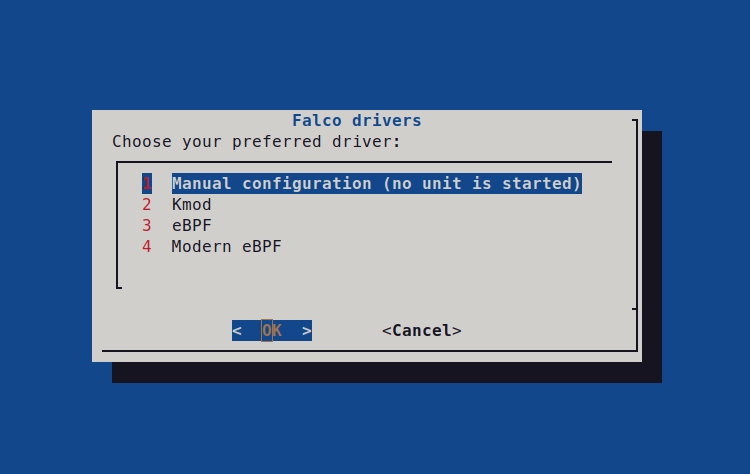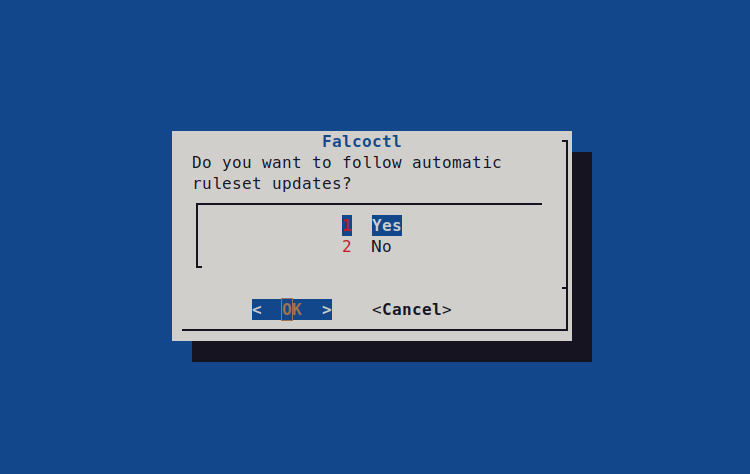Install
Falco is a Linux security tool that uses system calls to secure and monitor a system.
Falco can be used for Kubernetes runtime security. The most secure way to run Falco is to install Falco directly on the host system so that Falco is isolated from Kubernetes in the case of compromise. Then the Falco alerts can be consumed through read-only agents running in Kubernetes.
You can also run Falco directly in Kubernetes as a Daemonset using Helm, see the third-party integrations
There are 2 main ways to install Falco on your host:
- Falco packages (
.deb,.rpm) - Falco binary (
.tar.gz)
Falco packages
The Falco packages shipped with Falco 0.34 support for the first time other drivers besides the kernel module. The new systemd units' names are:
falco-bpf.servicefalco-kmod-inject.servicefalco-kmod.servicefalco-modern-bpf.servicefalco-custom.servicefalcoctl-artifact-follow.service(related to Falcoctl tool, see next sections)
This is still an experimental solution so our suggestion is to avoid relying on Falco systemd unit names since they could change between releases. The final idea would be to have a single falco.service configurable through usual systemd logic, but due to how Falco works today this solution is not viable.
Even if different units are available, you shouldn't run multiple Falco in parallel! Our units are not meant to be run in parallel!
On January 18th, 2023 the GPG key used to sign Falco packages has been rotated. Check out the related blog post and make sure you're using the most up-to-date key available at falco.org/repo/falcosecurity-packages.asc, and that you read the section below about package signing.
Installation details
Before looking at the installation on different distros, let's focus on what we should expect when we install the package.
The Falco package will look into your system for the dialog binary, if the binary is there, the package will prompt a simple configuration dialog, otherwise, it will install the unit files without starting any systemd service.
Note: If you don't have the
dialogbinary installed on your system a manual configuration is always required to start Falco services.
Even if you have the dialog binary installed, you can disable the interactive prompt by using the FALCO_FRONTEND env variable, you should simply set its value to noninteractive when installing the package.
FALCO_FRONTEND=noninteractive apt-get install -y falco
Let's see an example of how to install the package in a Debian-like system, for example, Ubuntu.
Trust the
falcosecurityGPG keycurl -fsSL https://falco.org/repo/falcosecurity-packages.asc | \ sudo gpg --dearmor -o /usr/share/keyrings/falco-archive-keyring.gpgConfigure the apt repository
sudo cat >>/etc/apt/sources.list.d/falcosecurity.list <<EOF deb [signed-by=/usr/share/keyrings/falco-archive-keyring.gpg] https://download.falco.org/packages/deb stable main EOF
In older releases of Debian (Debian 9 and older ones), you might need to additionally install the package apt-transport-https to allow access to the Falco repository using the https protocol.
The following command with install that package in your system:
$ sudo apt-get install apt-transport-https
Update the package list
sudo apt-get update -yInstall some required dependencies that are needed to build the kernel module and the BPF probe
sudo apt install -y dkms make linux-headers-$(uname -r) # If you use the falco-driver-loader to build the BPF probe locally you need also clang toolchain sudo apt install -y clang llvm # You can install also the dialog package if you want it sudo apt install -y dialogNote: You don't need to install these deps if you want to the modern BPF probe
Install the Falco package
sudo apt-get install -y falco
Installation with dialog
If you have the dialog binary installed on your system, you will be prompted with this:

From here you can choose one of our 3 drivers Kmod, eBPF, Modern eBPF or a Manual configuration.
Here we select the Kmod case as an example. After the first dialog, you should see a second one:

Falcoctl is a tool revamped with Falco 0.34 that offers shiny new features! One of the most important is the automatic rulesets update,
our suggestion is to enable it by default, in this way you will always have your Falco instance running with the most updated rules.
Rule update
If you set the rule update as default, typing systemctl list-units | grep falco you should see something similar to this:
falco-kmod-inject.service loaded active exited Falco: Container Native Runtime Security with kmod, inject.
falco-kmod.service loaded active running Falco: Container Native Runtime Security with kmod
falcoctl-artifact-follow.service loaded active running Falcoctl Artifact Follow: automatic artifacts update service
falco-kmod-inject.serviceinjects the kernel module and exits. This unit remains after exit to detach the kernel module when thefalco-kmod.servicewill be stopped.falco-kmod.serviceinstance of Falco running the kernel module. Since the kernel module is the default Falco driver, you can also use thefalcoalias to start/stop it once enabled.falcoctl-artifact-follow.serviceinstance of Falcoctl that searches for new rulesets. This unit will be stopped whenfalco-kmod.serviceterminates.
The Falcoctl service is strictly related to the Falco one:
- when the Falco service starts it searches for a unit called
falcoctl-artifact-follow.serviceand if present it starts it. Please note that following this pattern, if you enable the Falco service and you reboot your system, Falcoctl will start again with Falco even if you don't enable it throughsystemd enable! You can disable this behavior by stopping the Falcoctl service and masking itsystemctl mask falcoctl-artifact-follow.service. - when the Falco service stops also the Falcoctl service is stopped.
No Rule update
In this case, the Falco package will only start the falco-kmod.service. Typing systemctl list-units | grep falco you should see something similar to this:
falco-kmod-inject.service loaded active exited Falco: Container Native Runtime Security with kmod, inject.
falco-kmod.service loaded active running Falco: Container Native Runtime Security with kmod
In this mode, the Falcoctl service is masked by default so if you want to enable it in a second step you need to type systemctl unmask falcoctl-artifact-follow.service.
Final remarks on the dialog
When you choose a driver from the dialog (in our case Kmod), the systemd service is always enabled by default so it will start at every system reboot. If you want to disable this behavior type systemctl disable falco-kmod.service (if you are using the kernel module like in this example). If enabled, the Falcoctl service will follow the same behavior as Falco so it is enough to disable the Falco service.
Installation without dialog (Manual configuration)
If you remember well, in the dialog we also had the Manual configuration. This option installs only the Falco units into the system without starting any service, this is the equivalent of not having the dialog binary installed on the system.
Since no service is started, you have to manually configure services after the installation phase. You can see an example of how to configure the falco-bpf service in the Running section
Installation on different Distros
We have already seen the installation steps on a Debian-like system, let's see some other Distros.
CentOS/RHEL/Fedora/Amazon Linux
Trust the
falcosecurityGPG keyrpm --import https://falco.org/repo/falcosecurity-packages.ascConfigure the yum repository
curl -s -o /etc/yum.repos.d/falcosecurity.repo https://falco.org/repo/falcosecurity-rpm.repoUpdate the package list
yum update -yInstall some required dependencies that are needed to build the kernel module and the BPF probe
# If necessary install it using: `yum install epel-release` (or `amazon-linux-extras install epel` in case of amzn2), then `yum install make dkms`. yum install -y dkms make # If the package was not found by the below command, you might need to run `yum distro-sync` in order to fix it. Rebooting the system may be required. yum install -y kernel-devel-$(uname -r) # If you use the falco-driver-loader to build the BPF probe locally you need also clang toolchain yum install -y clang llvm # You can install also the dialog package if you want it yum install -y dialogNote: You don't need to install these deps if you want to use the modern BPF probe
Install the Falco package
yum install -y falcoUninstall Falco:
yum erase -y falco
You might need to validate the driver signature if your system has UEFI SecureBoot enabled.
Follow these steps to do so:1. Import the DKMS Machine Owner Key $ sudo mokutil --import /var/lib/dkms/mok.pub 2. Restart the system and wait for the MOK key enrollment prompt 3. Choose the option: Enroll MOK 4. Load the Falco driver $ insmod /var/lib/dkms/falco/4.0.0+driver/$(uname -r)/x86_64/module/falco.ko.xz
openSUSE
Trust the
falcosecurityGPG keyrpm --import https://falco.org/repo/falcosecurity-packages.ascConfigure the zypper repository
curl -s -o /etc/zypp/repos.d/falcosecurity.repo https://falco.org/repo/falcosecurity-rpm.repoUpdate the package list
zypper -n updateInstall some required dependencies that are needed to build the kernel module and the BPF probe
zypper -n install dkms make # If the package was not found by the below command, you might need to run `zypper -n dist-upgrade` in order to fix it. Rebooting the system may be required. zypper -n install kernel-default-devel-$(uname -r | sed s/\-default//g) # If you use the falco-driver-loader to build the BPF probe locally you need also clang toolchain zypper -n install clang llvm # You can install also the dialog package if you want it zypper -n install dialogNote: You don't need to install these deps if you want to use the modern BPF probe
Install Falco:
zypper -n install falcoUninstall Falco:
zypper rm falco
Falco binary
In these steps, we are targeting a Debian-like system on x86_64 architecture. You can easily extrapolate similar steps for other distros or architectures
Download the latest binary:
curl -L -O https://download.falco.org/packages/bin/x86_64/falco-0.34.1-x86_64.tar.gzInstall Falco:
tar -xvf falco-0.34.1-x86_64.tar.gz cp -R falco-0.34.1-x86_64/* /Install some required dependencies that are needed to build the kernel module and the BPF probe. If you want to use other sources like the modern BPF probe or plugins you can skip this step.
apt update -y apt install -y dkms make linux-headers-$(uname -r) # If you use the falco-driver-loader to build the BPF probe locally you need also clang toolchain apt install -y clang llvmRun
falco-driver-loaderbinary to install the kernel module or the BPF probe. If you want to use other sources like the modern BPF probe or plugins you can skip this step.
To install the driver, the
falco-driver-loaderscript requires write and execution permissions on the/tmpdirectory, as it will try to create and execute a script from there.
```bash
# If you want to install the kernel module
falco-driver-loader module
# If you want to install the eBPF probe
falco-driver-loader bpf
```
By default, the `falco-driver-loader` script tries to download a prebuilt driver from [the official Falco download s3 bucket](https://download.falco.org/?prefix=driver/). If a driver is found then it is inserted into `${HOME}/.falco/`. Otherwise, the script tries to compile the driver locally, for this reason, you need the dependencies at step [3].
You can use the env variable `DRIVERS_REPO` to override the default repository URL for prebuilt drivers. The URL must not have the trailing slash, i.e. `https://myhost.mydomain.com` or if the server has a subdirectories structure `https://myhost.mydomain.com/drivers`. The drivers must be hosted with the following structure:
```bash
/${driver_version}/falco_${target}_${kernelrelease}_${kernelversion}.[ko|o]
```
where `ko` and `o` stand for Kernel module and `eBPF` probe respectively. This is an example:
```text
/a259b4bf49c3330d9ad6c3eed9eb1a31954259a6/falco_amazonlinux2_4.14.128-112.105.amzn2.x86_64_1.ko
```
You are finally ready to run the Falco binary!
Package signing
Most Falco packages available at download.falco.org are provided with a detached signature that can be used to verify that the package information downloaded from the remote repository can be trusted.
The latest trusted public GPG key used for packages signing can be downloaded from falco.org/repo/falcosecurity-packages.asc. The following table lists all the keys employed by the organization currently and in the past, including the revoked ones. We recommend updating the revoked keys to download their revocation certificate, and eventually removing them from your package verification system due to the signature made with them not being trustable anymore.
| Fingerprint | Expiration | Usage | Status | Download |
|---|---|---|---|---|
2005399002D5E8FF59F28CE64021833E14CB7A8D | 2026-01-17 | Signing Falco Packages | Trusted | falcosecurity-14CB7A8D.asc |
15ED05F191E40D74BA47109F9F76B25B3672BA8F | 2023-02-24 | Signing Falco Packages | Revoked | falcosecurity-3672BA8F.asc |
Was this page helpful?
Let us know! You feedback will help us to improve the content and to stay in touch with our users.
Glad to hear it! Please tell us how we can improve.
Sorry to hear that. Please tell us how we can improve.